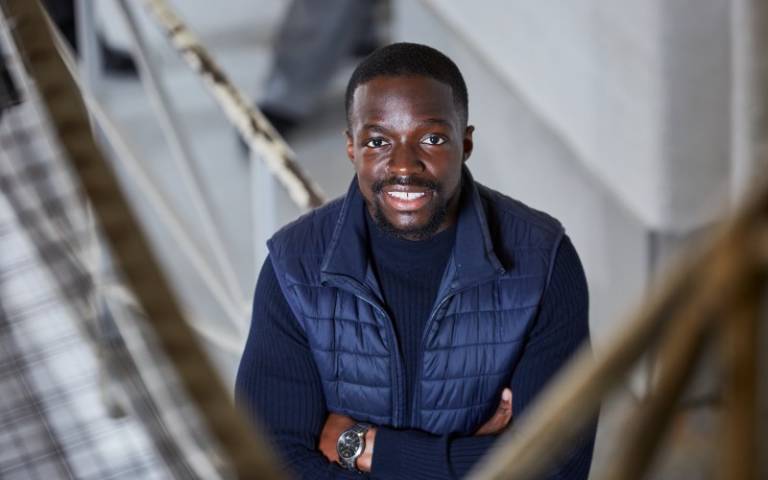Career spotlight: becoming a Prison Officer with Unlocked
Mofe shares information about Unlocked's leadership programme and offers a glimpse into a day in the life of a prison officer.

8 December 2021
Unlocked Graduates is working to change the way we develop society’s future leaders and how we think about prisons and prisoners – by focusing on rehabilitation and addressing the terrible damage and cost of reoffending.
Our award-winning leadership development programme recruits outstanding graduates and career changers to become exceptional prison officers. The skills and experience you gain leading reform on the front-line will make you stand out from any crowd.
Here, an International Relations Alum from the Univerity of Birmingham, Mofe, shares his experience of being a prison officer with Unlocked.
What is a typical day like as a prison officer?
One of the best things about the job is that genuinely no day is the same but there is a structure.
I’d get to the prison and have a formal briefing with the team. I would then facilitate morning activities with each of the prisoners such as education, gym, or different workshops. After lunch, I would continue to support their daily activities while maintaining a safe environment.
Throughout the day you would negotiate different tensions such as the problems they’d bring in from the outside and mental health needs.
Within all this, you’re talking with the prisoners, building relationships and solving their problems, such as helping them communicate with their families. You’ve got to remember that you’re working in a team of four to eight officers to run a wing of 60 to 120 prisoners so it’s very fast-paced and you never know what the day will throw at you.
“Being on the Unlocked programme meant that you might have a meeting with your mentor or some training. You’d also have regular study days and need to keep up to date on studies for your Masters.
What are you most proud of from your time as a prison officer?
What was key for me was the relationships that I built and the ways in which I worked to change the perception of what a prison officer is. It wasn’t me against them. It was me and them working to help them.
Taking the time to have deep meaningful conversations and seeing the best in the prisoners. It was very important for me to help change the culture of what a prison officer is meant to be and do for a prisoner.
What were the challenges?
Two things. First, in terms of the prisoners, not everyone would be receptive to you trying to build relationships with them. I had to focus on breaking down the prisoner vs prison officer mindset.
More widely, prisons are tough places and, when you see prisoners returning multiple times, it can be hard to stay focused on that belief in change and rehabilitation.
Sometimes colleagues did not have the same mentality, and this can make culture change very hard.
“At Unlocked we’re really pushed to think about what we can do today to fix the problems we can see so it’s a challenge but in best way!
How did working as a prison officer prepare you for the job you have now?
I’ve just started work as a management consultant. When I left university, this was probably more of the type of job I imagined doing but when I saw the Unlocked programme I loved the idea of getting some real frontline experience. It’s a leadership programme and working as a prison officer definitely give you the opportunity to be a leader as well as developing a lot of soft skills which I can really use in any environment. Whether it be relationship building, leadership or teamwork. It gave me the capacity to understand how to deal with difficult conversations and make decisions under pressure. I’m currently working on a project that deals with prison technology. My knowledge of the prison system has helped significantly in understanding the dynamics of this project.
I definitely did not imagine being a prison officer when I was in my final year but I just loved the idea of Unlocked. I also found it reassuring that they had some great corporate links. I even did a work placement at PA Consulting while on the programme which allowed me to see how the public sector can link with that world.
What was the assessment process like?
It’s a very memorable assessment process!
It has changed slightly since I did it but these days you do a short situational judgement test and then a video interview.
At every stage they’re trying to understand your motivations and to identify whether you had the key attributes like leadership and resilience.
The assessment day is really fun. There was a group task and an interview where you are interviewed by a prison officer and an ex-prisoner which gives you a really good insight into the role. The most interesting bit was the role play where an actor plays the role of a prisoner and you have to walk into a situation.
It’s designed to give you a real flavour of the job and it was definitely the most interesting assessment centre I attended! I also really liked the fact that, once you were offered a place, you got a chance to visit a prison so you could see the environment and make sure it was for you.
Top tip: Employers don’t expect you to have all the answers when you apply for roles, but you will need to show that you have the potential to develop their attributes to a high standard so be sure to research these so that you have a good understanding before you apply.
 Close
Close

